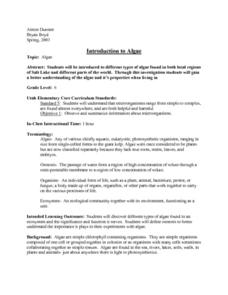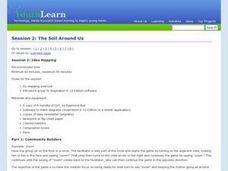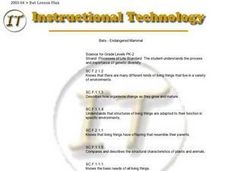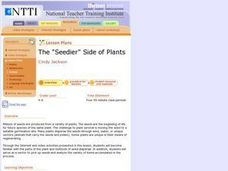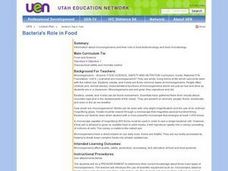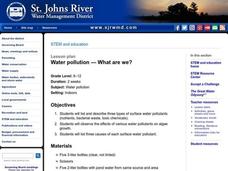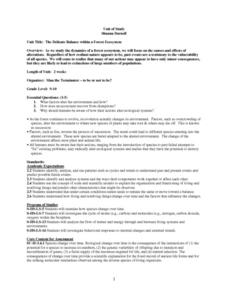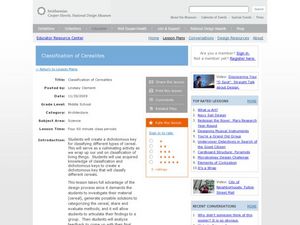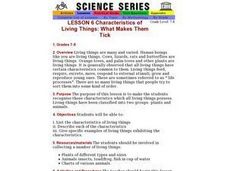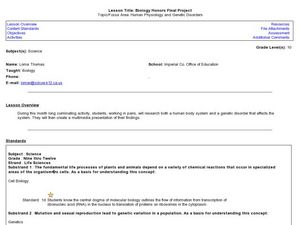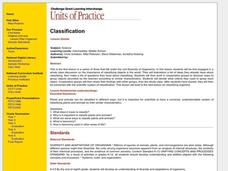Curated OER
Introduction to Algae
Students explore different types of algae found in both local regions of Salt Lake and different parts of the world. They discover different types of algae found in an ecosystem and the significance and function it serves.
Curated OER
Idea Mapping
Students generate, share and display ideas as a group. They break into small groups to work on hand-drawn maps made up of concentric circles. they come before the group and make a similar diagram by charting each other's characteristics.
Curated OER
Mammal Morphology - Bats, People, and Other
In this physical characteristics worksheet, students compare bats and humans by putting a + sign in the chart for whether or not bats and humans have the same characteristics. Students do this for 17 characteristics and answer 3 questions.
Curated OER
Bats - Endangered Mammal
Students complete question sheet on Bats and research information using a list of websites provided by the teacher. They work with peers to complete a scavenger hunt worksheet about bats.
Curated OER
The "Seedier" Side of Plants
Young scholars demonstrate seed dispersal vectors through role-play, analyze seed types, identify plant parts, list seven conditions plants need in order to grow, and describe how seeds travel.
Curated OER
Create a Classroom Exhibit: Rocks and Minerals
Young scholars bring in rocks and minerals from home. They observe them and describe them carefully, completing a worksheet. Finally, a classroom exhibit is created.
Curated OER
Bacteria's Role in Food
Students grow bacteria cultures on agar in petri dishes and do a plate count. They participate in a yogurt making lab to see how bacteria produce lactic acid. They prepare a recipe and identify fungi, fermentation and the role of...
Curated OER
Hazardous Chemicals in Your Neighborhood
Students examine the effect of hazardous chemicals on humans. They discover how the chemicals are cleaned up and the facilities in their neighborhood. They identify federal and local agencies that oversee environmental hazards
Curated OER
D¿rer Watercolor - Patterns and Texture
Learners create watercolor paintings using their knowledge of elements of design, value, and texture, discuss concept of art reflecting time and place, review art-related vocabulary, and reflect on their work.
Curated OER
What Are We?
Learners list and describe three types of surface water pollutants. They observe the effects of various water pollutants on algae growth. Three causes of each surface water pollutant is listed.
Curated OER
The Delicate Balance within a Forest Ecosystem
Students examine the causes and effects of alterations in a forest ecosystem and evaluate how human actions may only seem to have minor consequences, but can lead to extinctions of large numbers of populations. Students produce an...
Curated OER
Dichotomous Keys
Young scholars define the word dichotomous and explain why a dichotomous key is a useful tool in identifying different species. Then they look up words they are unfamiliar with or mollusk reference books so students can
learn the names...
Curated OER
Rocks and Minerals
Students bring rocks and minerals from home to investigate in the classroom. In this rocks and minerals lesson plan, students observe all the rocks and minerals brought into the class and answer 7 questions about the features of the...
Curated OER
"ART ZOO 'Blacks in the Westward Movement', 'What Can You Do with a Portrait', and 'Of Beetles, Worms, and Leaves of Grass'"
Students study black history, examine portraits and portrait making and create their own portraits, and investigate their natural environment. This humanities lesson provides a text that can be used to teach lessons in black...
Curated OER
Draw an Alien in Natural Habitat
Students apply prior knowledge of living things, structures of living things and how living things sense and respond to their environment. In this habitat lesson, students review the basic needs of organisms to survive. Students create...
Curated OER
Classification of Cerealites
Young scholars create a dichotomous key. In this categorizing lesson, students create a dichotomous key for different types of cereal. Young scholars classify the cereal into groups such as flakes and cereal with holes. Students discuss...
Curated OER
Journey to the Center of a Cell
Ninth graders create a large scale model of a eukaryotic cell. In this biology lesson, 9th graders identify the different parts and function of the cells by using a robot to navigate through the cell models. They create a video tutorial...
Curated OER
The Biological Carbon Cycle
Learners learn about the biological carbon cycle. In this carbon cycle lesson, students access the web site and mouse over the diagrams to follow the carbon cycle. They read about what happens to humans and plants during this cycle.
Curated OER
Characteristics of Living Things: What Makes Them Tick
Learners list the characteristics of living things and give specific examples of living things exhibiting these characteristics. They bring in examples of living things.
Curated OER
Biology Honors Final Project
Tenth graders work on a project about cellular biology and genetics. In this biology lesson, 10th graders research about the assigned human body system and genetic disorders that affect it. They create a multimedia presentation and...
Curated OER
Outdoor Seed Sowing
First graders identify vegetables and flowers that can be grown from seed. In this seed sowing lesson, student learn the correct spacing and planting of various types of seeds. Students label plants.
Curated OER
Frog Metamorphosis
Students play 20 Questions with animal characteristics and then view an animation of how a tadpole changes into a frog. They consider the importance of camouflage to frogs and write out the story of a frog from tadpole to adult.
Curated OER
Classification
Students investigate how to classify items based on similar characteristics. They study the scientific system of classification.


